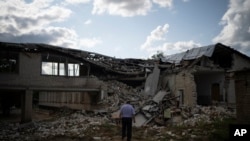In late May, the Faktor Druk printing plant in Kharkiv was hit during a missile attack.
Serhii Polituchyi, CEO of Faktor Druk Corp., which owns the plant, rushed to the scene, arriving before firefighters, and watched as the building was engulfed in flames. Seven of his employees were killed and 21 wounded.
According to Ukrainian authorities, the Russian military attacked Kharkiv and the neighboring city of Lubotyn with 15 missiles on May 23. One landed at Faktor Druk, the largest printing facility in Ukraine and one of the largest in Europe, destroying its binding shop — a 4,000-square-meter modern facility — and other critical equipment.
The plant printed about 40% of all books in Ukraine, including school textbooks. Before the full-scale invasion, it took orders from 16 European countries and the United States.
"The capacity allowed printing up to 50 million books per year, plus up to 100 million copies of magazines and 300 million newspapers. This is a huge blow to the industry," said Ihor Solovey, head of the Center for Strategic Communications and Information Security, a Ukrainian government institution.
Destroying Ukrainian identity
Polituchyi said he thought that Russians were deliberately targeting the book publishing facility, pointing to four other missiles landing in the close vicinity of the printing facility.
Solovey said it was the third printing house in Kharkiv hit by Russian missiles.
"This is a direct attack by the Russians on the Ukrainian language," said Rostyslav Karandieiev, Ukraine's acting minister of culture and information policy.
According to the Ukrainian Book Institute, Russian strikes and other aggressive actions have destroyed 174 libraries and almost 2 million books.
The Smithsonian Institution, located in Washington, has also documented the massive destruction of Ukraine’s book publishing facilities, some of which are designated as cultural heritage sites, as well as libraries and archives.
The Smithsonian, with its partners, such as at the Heritage Monitoring Lab in Ukraine, uses satellite sensing and imagery and on-the-ground examination to monitor conditions in Ukraine.
In their recent assessment of potential damage to sites in Ukraine from the beginning of the invasion through April 30, 2024, Katharyn Hanson, head of research at the Smithsonian Cultural Rescue Initiative, told VOA that they concluded that up to 143 sites identified as libraries or archives have been potentially damaged.
Its research in Donetsk Oblast found that cultural buildings had more than a 20% chance of being damaged compared with about a 13-14% chance for any other civilian buildings, including hospitals.
"This finding leads us to believe with some confidence that cultural buildings were deliberately targeted in the region," she said.
The Smithsonian's report, titled "Potential Damage to Ukrainian Cultural Heritage Sites," identified that between February 24, 2022, and April 30, 2024, potential damage was caused to 2,122 out of 28,710 cultural heritage sites in Ukraine, with the memorials and places of worship being the most affected.
"Damage and looting to Ukrainian cultural heritage sites may represent criminal acts, [that] violate the 1954 Hague Convention, and be potential war crimes or crimes against humanity," the report says.
The 1954 Hague Convention, to which Russia and Ukraine are member states, obligates its signature states to "respect" and "safeguard" cultural objects during armed conflict.
After the hit, Russian Telegram channels spread information that the printing house in Kharkiv produced drones for the Ukrainian army, debunked by Ukrainian fact-checker Gwara media.
Leading up to the 2022 full-scale invasion, Russian President Vladimir Putin published a lengthy essay arguing that "true sovereignty of Ukraine is possible only in partnership with Russia" because of the ties formed during" their shared history. They are, therefore, "one people."
In the course of the invasion and occupation, Ukrainian authorities and human rights groups documented Russians targeting the expression of Ukrainian national identity, including speaking or reading in the Ukrainian language.
In its March 2024 report, the United Nations Office of the High Commissioner for Human Rights details violence and intimidation employed by Russia to impose Russian language, laws and education while "suppressing expressions of Ukraine" culture and identity."
"Ukrainians opposing occupation or expressing their identity as Ukrainians were labeled as Nazis," the report says. "The United Nations Special Rapporteur on Cultural Rights has specifically warned that this denial of Ukrainian identity and history as a justification for war violates Ukrainians' right to self-determination."
Russia invaded Ukraine on February 24, 2024, claiming the Russian military was seeking the "denazification" of its neighboring country. Ukraine and Western nations condemned the actions, with the EU and Western countries leveling harsh economic sanctions against Moscow and providing military, food and medical aid to Kyiv.
Ukraine's capital of book publishing
The Howard G. Buffett Foundation announced that it would help to rebuild the facility and replace the equipment.
In a written reply to VOA, Howard G. Buffett, the son of billionaire Warren Buffett, said the foundation estimates it will spend at least $8 million. Despite focusing primarily on civilian needs in Ukraine, the foundation thought allocating funds to help the publisher was important.
"Putin is actively targeting for destruction and occupation any civilian infrastructure that represents Ukrainian identity, including this publisher of textbooks for Ukrainian schools. This war is as much about affirming Ukrainians' right to exist as a people in a sovereign nation as it is about deterring Russian aggression that threatens the Western world," Howard G. Buffett wrote.
The printing facility will remain in Kharkiv, a city 20 kilometers from the Russian border, which has been experiencing an almost-daily barrage from Russian drones and missile strikes.
"Historically, Ukraine's vast majority of printing capacities are concentrated in Kharkiv. Experts believe that Kharkiv printing houses provide up to 80% of the total volume of printing services," Oleksandra Koval, director of the Ukrainian Book Institute, told VOA.
Since the early 19th century, when a printing shop of Kharkiv University became one of the leading printing facilities in Ukraine under the Russian empire, the city has been attracting book publishers and writers.
Factor Druk’s Polituchiy said that modern book printing requires a high degree of specialization, and most of these specialists live in Kharkiv, the second-largest city in Ukraine. He said that moving a printing plant with complex equipment to a safer area of the country would be prohibitively expensive.
He plans to rebuild the printing plant and hopes that it will not be hit by another Russian missile or drone.



